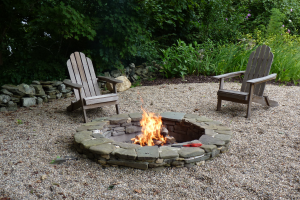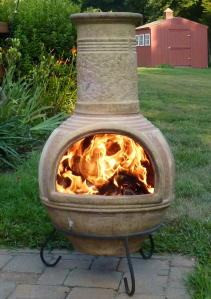Campfires, Bonfires, Fire Pits, Chimineas and Other Similar Devices

The burning of wood in a campfire, bonfire, chiminea or other similar devices is prohibited if the burning is conducted so that it creates a nuisance for neighbors or it is in violation of any restrictions imposed on such burning by your local municipality. Campfires and/or bonfires are not defined by state statute or regulation; however, some towns have special requirements to conduct this type of burning and may require the homeowner to obtain a permit prior to having a campfire on his or her property.
Special requirements may include: limiting the size of such fires; setback distances from structures and/or property lines; lot size; and requiring campfires and/or bonfires to be permitted. Please check with your local Open Burning Official, Fire Marshal or town hall for any restrictions or requirements.
Incomplete Combustion

Incomplete combustion typically occurs when wood is burned in a campfire, bonfire, fire pit, chiminea or similar device and can result in large amounts of smoke and un-burnt particulate matter. Emissions from incomplete combustion pollute the air and can make it difficult for people with respiratory problems to breathe. Excessive smoke emitted into the atmosphere at ground level can be a nuisance to your neighbors, particularly in densely populated areas.
A nuisance is considered to be the unreasonable, unwarranted, or unlawful use of one's property in a manner that substantially interferes with the use or enjoyment of another individual's real property, without an actual trespass or physical invasion to the land.
Burning Requirements
Non-processed wood is considered to be any untreated, natural wood up to and including rough cut lumber. Processed wood is considered to be any wood that has been milled and/or planed and includes recycled wood, glued wood, treated wood, pallets, crates, and/or wood scraps from these types of materials.
- Check with your town, which may have special requirements to conduct this type of burning and may require the homeowner to obtain a permit prior to having a campfire/bonfire on his or her property.
- Burn only clean, non-processed wood.
You should not burn wood pallets, construction debris, painted wood, stained/treated wood, or garbage in a campfire/bonfire, fire pit, chiminea or other similar device.
Safety Concerns
When burning wood in a campfire/bonfire or in one of the above-mentioned devices, the utmost caution must be exercised to prevent injury to yourself or others and to prevent damage to your home or property.
Do you have a complaint regarding regarding campfires, chimineas, fire pits, or other similar devices?
Smoke, nuisance odors, or other complaints regarding campfires, chimineas, fire pits, or other similar devices are best directed to your Open Burning Official and/or local Fire Marshal. Please visit your town's website to obtain the appropriate contact information.
Issues or concerns relating to the health effects created or experienced during open burning should be directed to your local Open Burning Official as well as your local Health Department.
Please do not call the CT DEEP for residential open burning complaints, every municipality should have an enforcement program in place to effectively handle any and all residential open burning complaints/issues.
In the case of an emergency please call 911 or your local Fire Department.
Compliance Assurance Home | Training & Education | Forms | Enforcement | Other Programs | FAQs | Contact Us
Content Last Updated on: January 16, 2026

